So according to what I have read, the computer will pull timing if the sensor senses ANYTHING. I read the discriptions of real and fake knock on ZZP, and I am thinking that the 8 degrees I am seeing right now might indeed be "fake" knock. it is not a gradual increase in knock. It is instant as soon as I put my foot in it, and it decreases at the RPM increase, and as exhaust note mellows out. I think the sensor is picking up the leak from my downpipe.
Anyone ever had experiance with this?
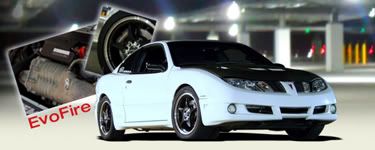
Take out 5-8 dgree's in the are you are getting it and see if you still have it.
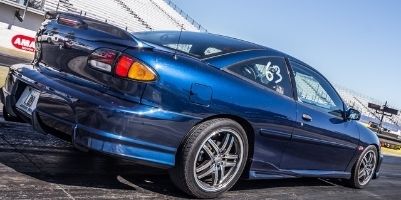 FU Tuning
FU Tuning
EvoFire - Does your knock log in HP Tuners look like a staircase? Meaning, it instantly peaks at 8 degrees of knock, and then ladders down a degree or two at a time like in this pic?

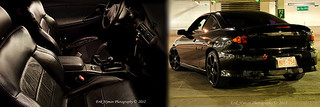
whats your afr when it knocks?
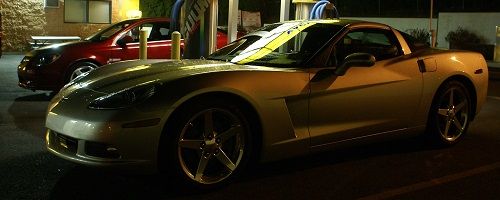
according to my wideband 11.3-11.7
Edited 1 time(s). Last edited Monday, October 03, 2011 7:39 PM

Been having the same issue. It's possible that it is some sort of false knock, because it goes away fairly quickly.
Check everything that could be rattling and causing the sensor to pick it up. (loose nuts/bolts, exhaust, or even piping or connectors banging around against the block) Make sure the sensor is torqued correctly as well. These sensors seem to be fairly sensitive (not as much as the 2.4L has with ghost knock issues). Unfortunately with HPT, there is no Burst Knock or Knock Sensitivity alteration tables for our cars.
The main thing that I got from ZZP is:
What is REAL KR and what is FALSE KR?
Real KR is KR that grows with engine RPM and engine load. It depends entirely on detonation, which is dependant upon throttle position, MAF, MAP, engine load, engine temperature, and RPM. As RPM and engine load increase, the chance for KR (or higher KR) increases. As the vehicle shifts to the next gear, KR will usually make a small jump up as well due to the higher engine load.
False knock is characterized by a sharp spike to an immediately high value of KR followed instantly by the KR Recovery Rate. It doesn't grow with engine RPM or load, it jumps to a high value on throttle input and then recovers to a low value, or zero perhaps, as engine RPM continues to increase. (hence the previous ladder picture I posted) This is exactly opposite to the characterization of REAL KR. Remember, knock is simply specific noise detected by engine microphones. Because it happens to fall with in the frequency of real KR does not necessarily mean that it IS real KR.

good to know others are researching this too....

Yeah, the only thing I can think to do is get some race gas, and throw it in.
If the knock goes away. Then it was real knock on pump gas.
If it doesn't go away, then tune it and alter the tables so the sensor won't pull all that timing on you. (don't turn OFF the knock sensor though)
Other than going full standalone, I really don't know what to tell ya. HPT is extremely limited for our cars.

There are tables in HPT that can be used to desensitize the knock sensor.....
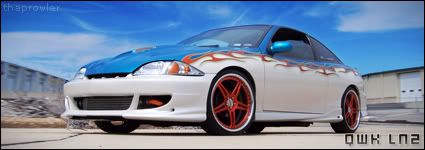
P&P Tuning
420.5whp / 359.8wtq
^^^ this is what I have also heard.


The plot that eric nyman posted I would call real knock. It's there, then it decays slowly until knock is no longer detected. When there is a sudden very quick spike due to a load change, like cruising to punching it, for WOT then shifting, I tend to call that false knock. It's a quick spike that is there and gone in a fraction of a second.
Either way though, false or real, keep in mind that if the computer sees it and learns it, you will eventually not get full advance in those cells. Meaning when the car is at the load and RPM where this is happening, it will start to automatically pull timing from what is commanded. Take it for what it's worth, but i've found on these blower cars that actually running to rich with too little timing can cause KR as well.

Quote:
but i've found on these blower cars that actually running to rich with too little timing can cause KR as well.
I have found this on the Eco as well.
 FU Tuning
FU Tuning
ive got a ?...
has anyone actually ran say like 87 octane in there car and tried to see knock then ran say 93 and physically saw the knock count disappear with the higher octane gas?
and another thing, if you build ur set-up correctly why the ef do we even need a knock sensor?

-Z Yaaaa- wrote:ive got a ?...
has anyone actually ran say like 87 octane in there car and tried to see knock then ran say 93 and physically saw the knock count disappear with the higher octane gas?
and another thing, if you build ur set-up correctly why the ef do we even need a knock sensor?
On your first point - yes. Well, kind of. I've had "bad" 93 octane give me a @!#$ ton of KR, and when going to another station that I knew to be good, the KR disappeared.
On your second point, things happen, like bad gas, that make me thankful to have a knock sensor to attempt to preserve the motor. Honestly, I'd rather go through all the BS of troubleshooting false knock than run w/o one, especailly given our PCM's tendancy to advance timing even beyond what is in the tables when ZERO knock is detected. It's intersting how you find out how the PCM logic works when a piece of hardware, such as a knock sensor, is not really functioning right.

-Z Yaaaa- wrote:has anyone actually ran say like 87 octane in there car and tried to see knock then ran say 93 and physically saw the knock count disappear with the higher octane gas?
Of course.. I get knock on 93 and absolute zilch on 100..
2001 Olds Alero (LD9)
650 whp / 543 ft-lb
@turboalero
yeah on 91 i am getting 6-7 degrees. even when i only put a gallon of 100 in about 4 gallons of 91 the knock was GONE. if i could afford 100 id run that @!#$ all the time, but oh well. ill tune the knock out and be good to go.












